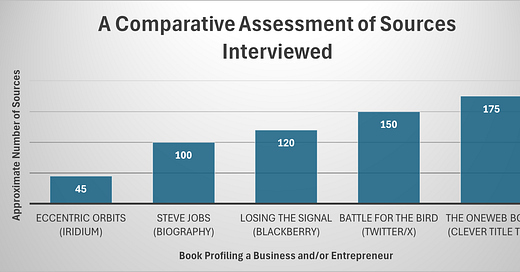OneWeb Book Update Vol. 8
At every increment of 25 new sources, I've issued an update on my progress. Initially the updates went to a small email list, but now that the book is public, updates are accessible here on Substack.
During my time as a reporter, one of the things I lamented was a lack of in-depth reporting on the satellite industry. Most space coverage was about human spaceflight, rockets, and the military. All those are worthy subjects, but the majority of human-made machines in space, then and now, are satellites, specifically telecommunications satellites, and they have a huge impact on the world.
I'm definitely biased, because my focus was always on satellites, and my fascination always the private sector. With the advent of mega constellations, journalists did turn their attention to commercial satellites, (mostly just Amazon and SpaceX, but an improvement nonetheless). What still hasn't happened yet is a second-order effect: an increase in deeply reported books on commercial satellite companies.
Most space books are still about the aforementioned topics, or about billionaires. I would argue that Ashlee Vance’s 2023 book “When the Heavens Went on Sale” is the first modern book to cast a wider net, covering companies that aren’t run by global magnates but still have had profound impacts on the space industry. More stories like this are warranted, which is a big part of why I began writing the OneWeb book.
I learned pretty quickly that books are far more intense of projects than news articles (which I wrote for seven years across Via Satellite and SpaceNews), and even research reports (which I’ve made for the past four years at Quilty Space). The amount of prep work is enormous. After ~16 months of effort, I’m pleased to have spoken to 175 sources for the OneWeb book – a figure that felt impossible at the beginning. These interviews, conducted mainly by phone and video calls, have stretched across 15 countries and, within the U.S., 16 states plus D.C. Counting sources I’ve spoken to more than once, the cumulative number of interviews is just over 300.
When I began studying OneWeb for a potential book, I set the goal of interviewing 100 people who worked at the company, were investors or partners. The number felt lofty, but I saw other authors reaching a similar number of sources, and decided it was a worthy target.
What I didn't account for was the flywheel effect. Nearly every person I interviewed has suggested another source (if not sources, plural) that also played a role in OneWeb’s journey. One interesting conversation begets another, and so on and so forth, and the number climbs.
Several of my latest interviews were with former employees who learned of the book when it was announced a few months ago and wanted to share their stories. These calls contributed to my knowledge of myriad parts of the OneWeb journey, including getting the launch campaigns ready, flying the satellites, the financing race pre-bankruptcy, the experience of various suppliers to Airbus OneWeb Satellites’s factory, user terminal developments, and my new favorite gateway story.
As the chart above shows, this book is a deeply researched effort, on par with the caliber of effort from books produced by reporters at Bloomberg (Battle for the Bird), WSJ (Losing the Signal), and other respected outlets. My focus now is on writing, so I can distill hundreds of hours of research into a high-quality book that captures one of the most important stories in space industry history. As always, thanks to everyone who has helped make this effort possible so far. I’m confident it will be a great read.





This is so exciting, Caleb! Thanks for the update.
I feel sure that you will be able to truly catch the spirit of the OneWeb project with this many interviews + your deep experience in research and reporting, and I look forward to reading! 📚 🛰️